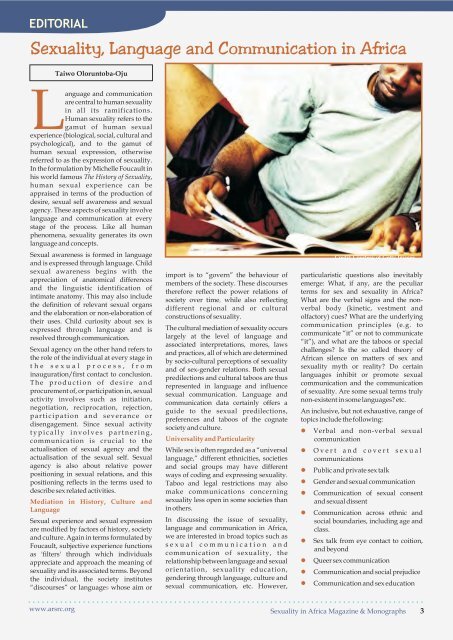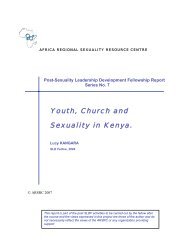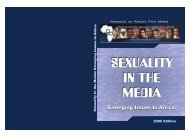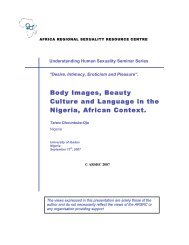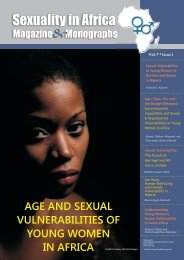Download - Africa Regional Sexuality Resource Centre
Download - Africa Regional Sexuality Resource Centre
Download - Africa Regional Sexuality Resource Centre
Create successful ePaper yourself
Turn your PDF publications into a flip-book with our unique Google optimized e-Paper software.
Language and communication<br />
are central to human sexuality<br />
in all its ramifications.<br />
Human sexuality refers to the<br />
gamut of human sexual<br />
experience (biological, social, cultural and<br />
psychological), and to the gamut of<br />
human sexual expression, otherwise<br />
referred to as the expression of sexuality.<br />
In the formulation by Michelle Foucault in<br />
his world famous The History of <strong>Sexuality</strong>,<br />
human sexual experience can be<br />
appraised in terms of the production of<br />
desire, sexual self awareness and sexual<br />
agency. These aspects of sexuality involve<br />
language and communication at every<br />
stage of the process. Like all human<br />
phenomena, sexuality generates its own<br />
language and concepts.<br />
Sexual awareness is formed in language<br />
and is expressed through language. Child<br />
sexual awareness begins with the<br />
appreciation of anatomical differences<br />
and the linguistic identification of<br />
intimate anatomy. This may also include<br />
the definition of relevant sexual organs<br />
and the elaboration or non-elaboration of<br />
their uses. Child curiosity about sex is<br />
expressed through language and is<br />
resolved through communication.<br />
Sexual agency on the other hand refers to<br />
the role of the individual at every stage in<br />
t h e s e x u a l p r o c e s s , f r o m<br />
inauguration/first contact to conclusion.<br />
T h e p r o d u c t i o n o f d e s i r e a n d<br />
procurement of, or participation in, sexual<br />
activity involves such as initiation,<br />
negotiation, reciprocation, rejection,<br />
p a r t i c i p a t i o n a n d s e v e r a n c e o r<br />
disengagement. Since sexual activity<br />
t y p i c a l l y i n v o l v e s p a r t n e r i n g ,<br />
communication is crucial to the<br />
actualisation of sexual agency and the<br />
actualisation of the sexual self. Sexual<br />
agency is also about relative power<br />
positioning in sexual relations, and this<br />
positioning reflects in the terms used to<br />
describe sex related activities.<br />
Mediation in History, Culture and<br />
Language<br />
Sexual experience and sexual expression<br />
are modified by factors of history, society<br />
and culture. Again in terms formulated by<br />
Foucault, subjective experience functions<br />
as 'filters' through which individuals<br />
appreciate and approach the meaning of<br />
sexuality and its associated terms. Beyond<br />
the individual, the society institutes<br />
“discourses” or language s whose aim or<br />
import is to “govern” the behaviour of<br />
members of the society. These discourses<br />
therefore reflect the power relations of<br />
society over time , while also reflecting<br />
different regional and or cultural<br />
constructions of sexuality.<br />
The cultural mediation of sexuality occurs<br />
largely at the level of language and<br />
associated interpretations, mores, laws<br />
and practices, all of which are determined<br />
by socio-cultural perceptions of sexuality<br />
and of sex-gender relations. Both sexual<br />
predilections and cultural taboos are thus<br />
represented in language and influence<br />
sexual communication. Language and<br />
communication data certainly offers a<br />
guide to the sexual predilections,<br />
preferences and taboos of the cognate<br />
society and culture.<br />
Universality and Particularity<br />
While sex is often regarded as a “universal<br />
language,” different ethnicities, societies<br />
and social groups may have different<br />
ways of coding and expressing sexuality.<br />
Taboo and legal restrictions may also<br />
make communications concerning<br />
sexuality less open in some societies than<br />
in others.<br />
In discussing the issue of sexuality,<br />
language and communication in <strong>Africa</strong>,<br />
we are interested in broad topics such as<br />
s e x u a l c o m m u n i c a t i o n a n d<br />
communication of sexuality, the<br />
relationship between language and sexual<br />
orientation, sexuality education,<br />
gendering through language, culture and<br />
sexual communication, etc. However,<br />
Credit: Courtesy of Getty Images<br />
particularistic questions also inevitably<br />
emerge: What, if any, are the peculiar<br />
terms for sex and sexuality in <strong>Africa</strong>?<br />
What are the verbal signs and the nonverbal<br />
body (kinetic, vestment and<br />
olfactory) cues? What are the underlying<br />
communication principles (e.g. to<br />
communicate “it” or not to communicate<br />
“it”), and what are the taboos or special<br />
challenges? Is the so called theory of<br />
<strong>Africa</strong>n silence on matters of sex and<br />
sexuality myth or reality? Do certain<br />
languages inhibit or promote sexual<br />
communication and the communication<br />
of sexuality. Are some sexual terms truly<br />
non-existent in some languages? etc.<br />
An inclusive, but not exhaustive, range of<br />
topics include the following:<br />
Verbal and non-verbal sexual<br />
communication<br />
O v e r t a n d c o v e r t s e x u a l<br />
communications<br />
Public and private sex talk<br />
Gender and sexual communication<br />
Communication of sexual consent<br />
and sexual dissent<br />
Communication across ethnic and<br />
social boundaries, including age and<br />
class.<br />
Sex talk from eye contact to coition,<br />
and beyond<br />
Queer sex communication<br />
Communication and social prejudice<br />
Communication and sex education


